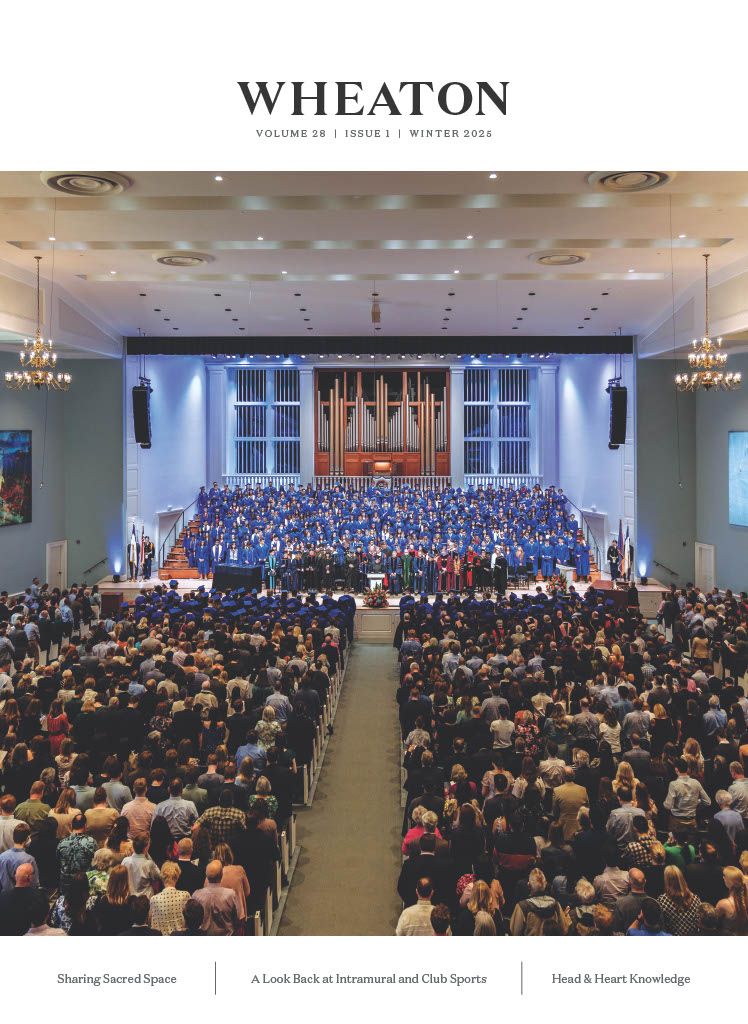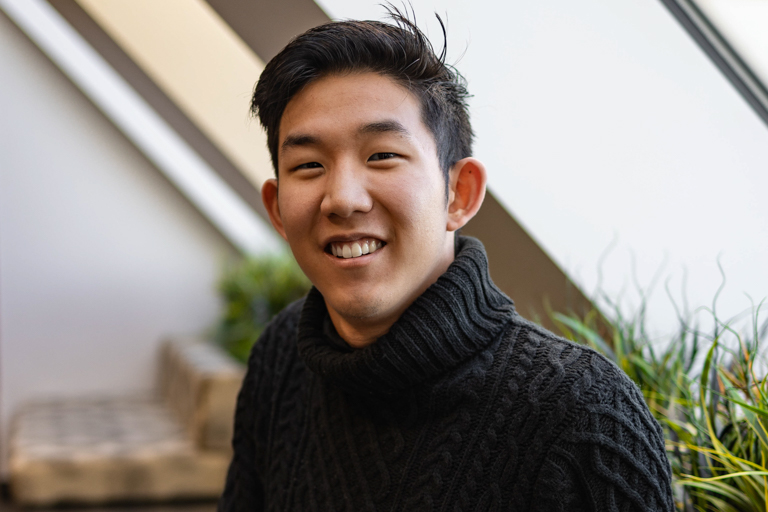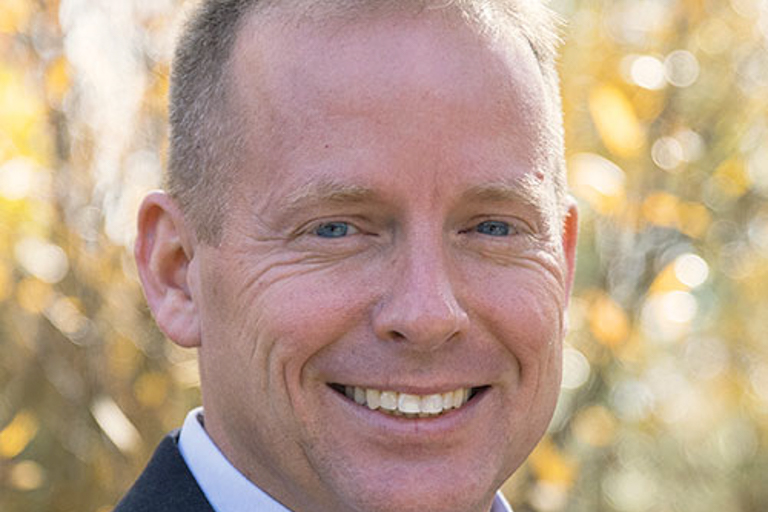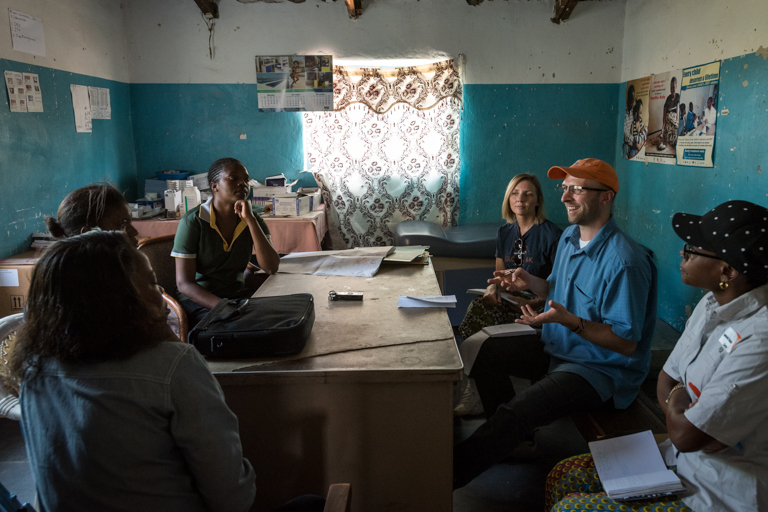An Ongoing Evangelical Legacy: Tracing Wheaton’s Roots with the Lausanne Movement
Words: Juliana Bacote ’24
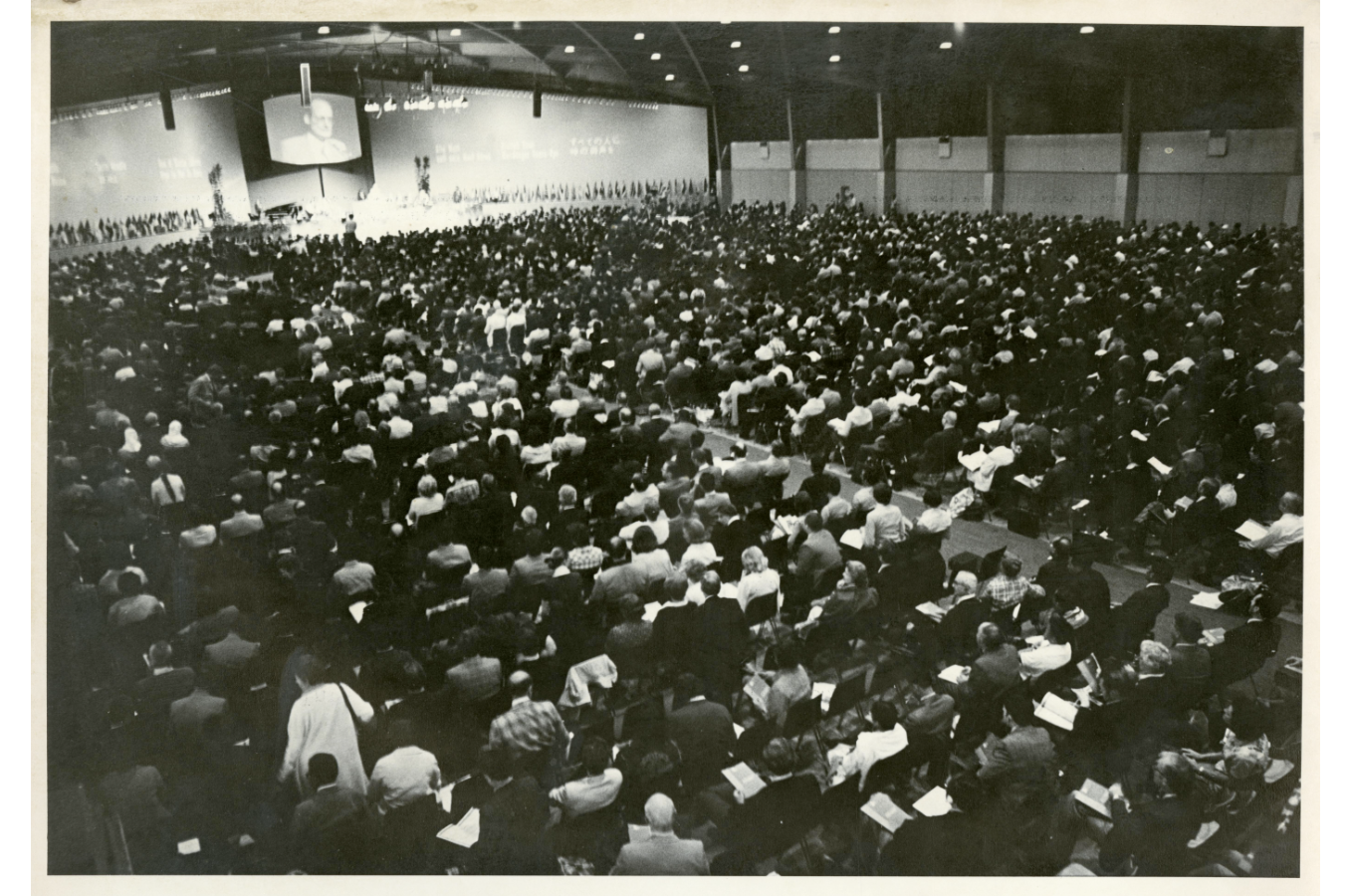
A full audience at the First International Congress on World Evangelization in Lausanne, Switzerland (1974).
Photo courtesy of Wheaton College Archives and Special Collections
In September 2024, the Lausanne Movement hosted the Fourth Lausanne Congress in Seoul-Incheon, South Korea. More than 5,000 individuals representing 202 nations attended, making it one of the most comprehensive Christian gatherings since the pandemic. Thousands more participated virtually. Wheaton College President Philip Ryken ’88 served as a plenary speaker and led a Bible exposition of the book of Acts at the congress, joined by more than 100 Wheaton College students, faculty, staff, and alumni.
“The Lausanne Movement has unified many believers worldwide under the cause of Christ and formed leaders in the global church,” said Ryken. “Wheaton College is grateful to be so deeply connected to a movement dedicated to evangelizing people in every nation and inviting them into the kingdom of God.” Wheaton College President Philip Ryken '88 speaks at the Fourth Lausanne Congress on World Evangelization in Seoul-Incheon, South Korea (2024). Photo by Grace Snavely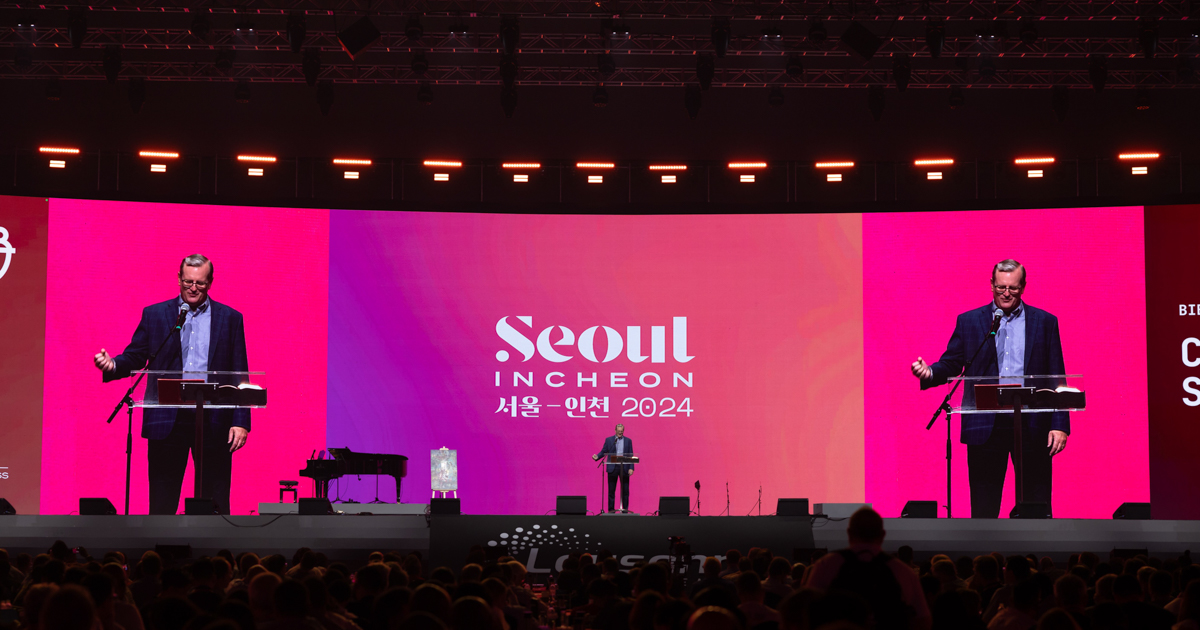
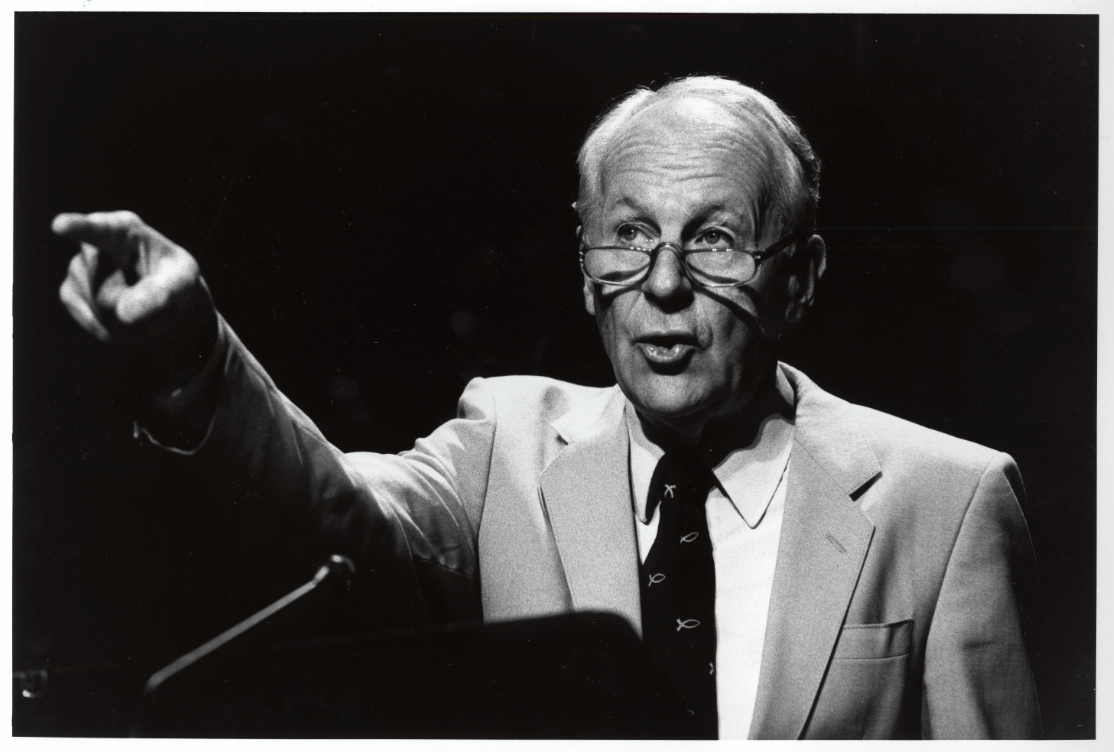
Theologian and evangelist John Stott speaks at the Second International Congress on World Evangelization in Manila, Philippines (1989).
Photo courtesy of Wheaton College Archives and Special Collections
In a video introducing the most recent congress, Michael Oh, current Global Executive Director and CEO of Lausanne, describes the heart of the Movement as “accelerating global mission together.” The Movement also centers around a fourfold vision: the gospel for every person, disciple-making churches for every people and place, Christlike leaders for every church and sector, and kingdom impact in every sphere of society.
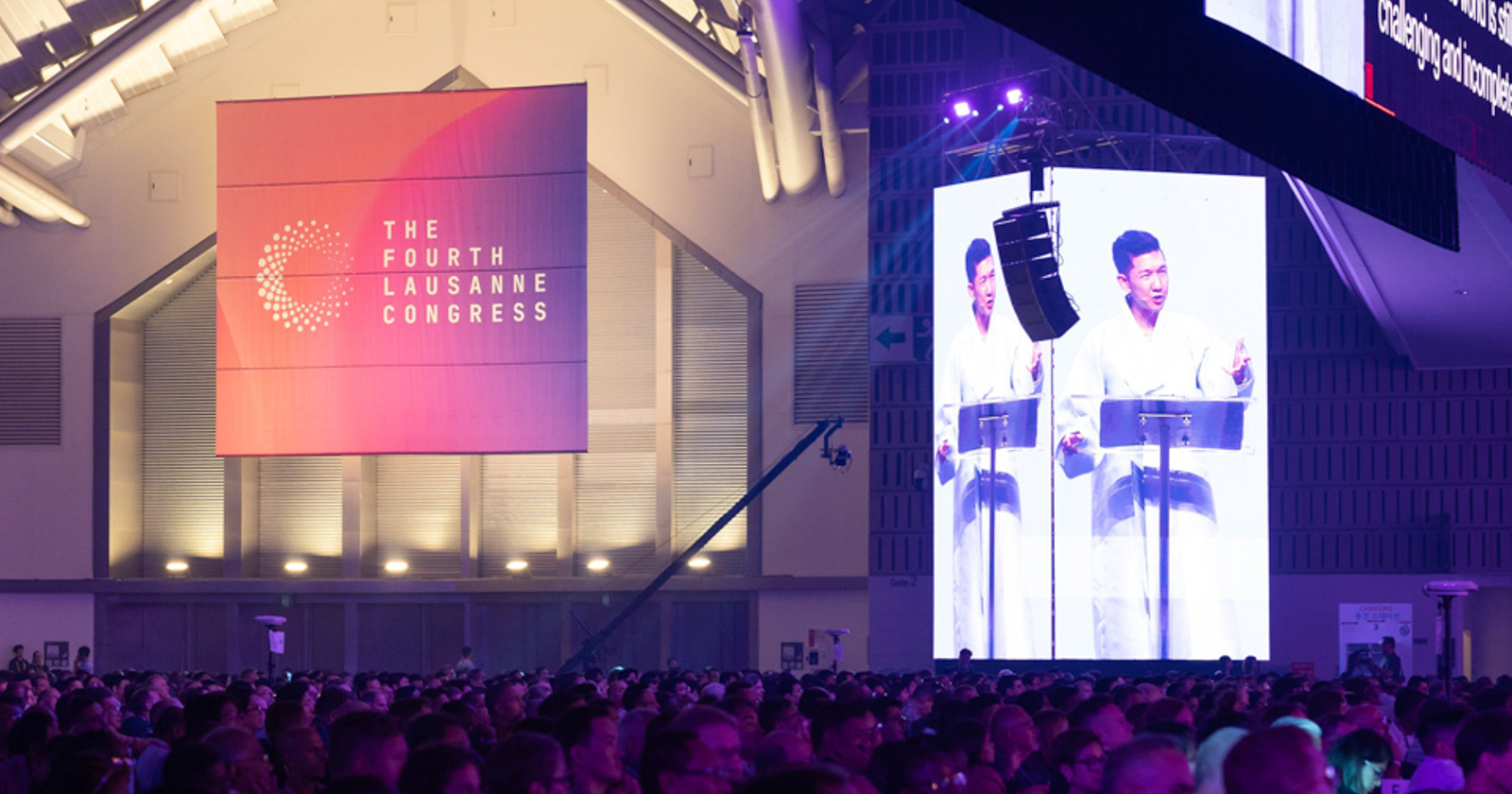
Michael Oh, current Global Executive Director and CEO of the Lausanne Movement, speaks at the Fourth International Congress on World Evangelization (2024).
Photo by Grace Snavely
In 1966, the Billy Graham Evangelistic Association partnered with Christianity Today to hold the World Congress on Evangelism in Berlin. Organized and chaired by Carl F. H. Henry ’38, M.A. ’41, Litt.D. ’68, it was initially a single event, with no plans for a second gathering. However, a meeting between Graham and a group of international advisers in 1971 changed the trajectory of evangelical history when they began exploring how to build on the event’s initial influence.
1974 brought the International Congress on World Evangelization, also known as the Lausanne Congress or Lausanne ’74, after its location in Lausanne, Switzerland. As described in an issue of World Evangelical Fellowship’s Theological News, the gathering’s purpose was to frame a biblical declaration on evangelism, challenge the church to complete the task of world evangelization, articulate the relationship between evangelism and social responsibility, and foster renewed koinonia among evangelicals worldwide.
In addition to pastors, church staff, and academic scholars, the congress drew leaders in business, government, and media. Although 2,700 participants formally registered for the July 16–25 event, the total number of people present, including spouses, guests, and staff, equaled almost 4,000, representing 150 nations and more than 135 denominations. Time magazine called it “possibly the widest-ranging meeting of Christians ever held.” Billy Graham '43, Litt.D. '56 speaks at the First International Congress on World Evangelization in Lausanne, Switzerland (1974). Photo courtesy of Wheaton College Archives and Special Collections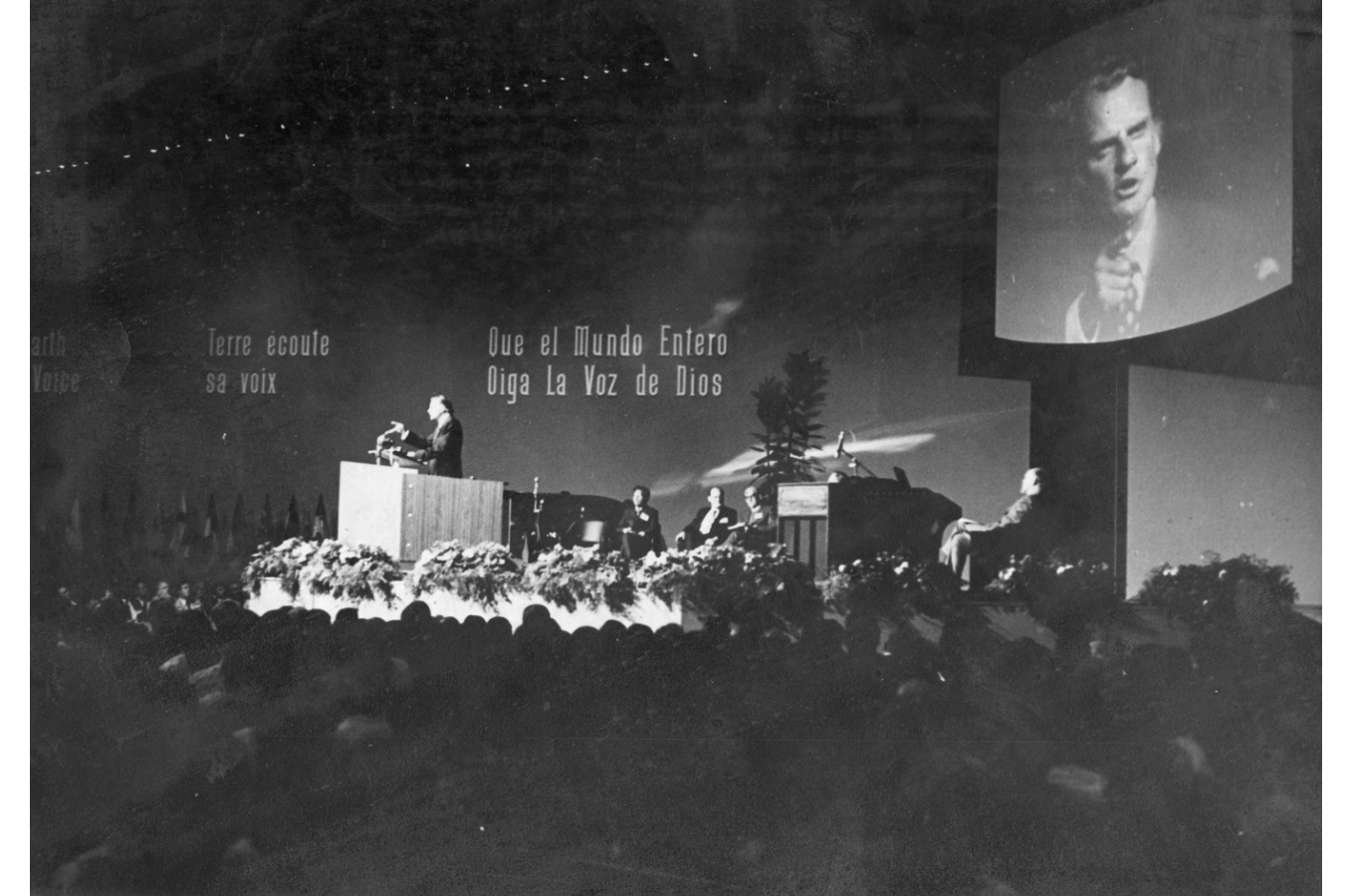
In an episode of the Lausanne Movement Podcast, Graham reflected on his early motivation for starting the Movement decades after its first congress. “I traveled the whole world and met so many amazing people and leaders, but I found they didn’t know each other.” In his opening address at Lausanne ’74, Graham called for evangelicals to carry what he referred to as the “Spirit of Lausanne” to the entire world, which he defined as “a spirit exemplified by prayer, study, partnership, and hope—in a spirit of humility.”
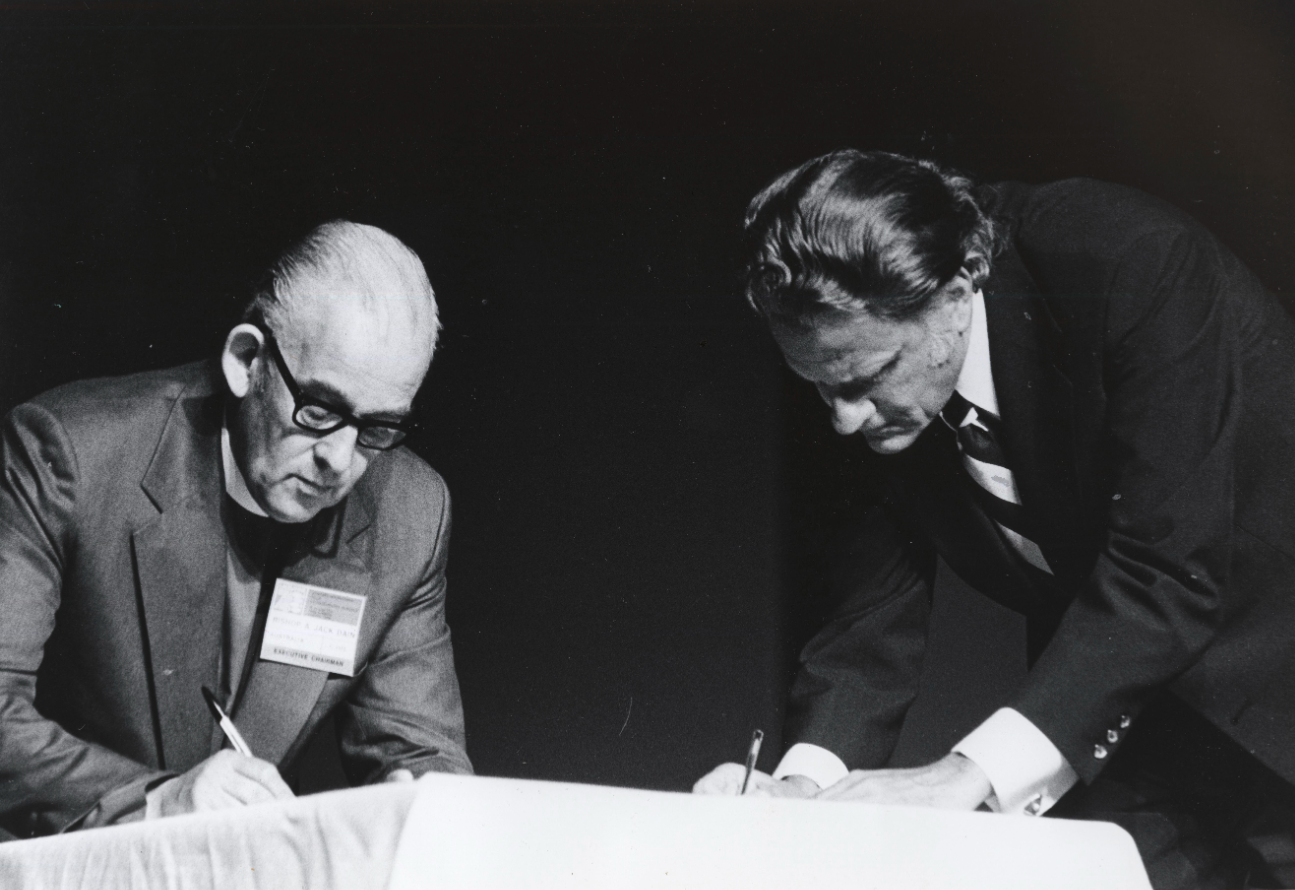
Bishop Jack Dain (left) and Graham (right) at the First International Congress on World Evangelization in Lausanne, Switzerland (1974).
Photo courtesy of Wheaton College Archives and Special Collections
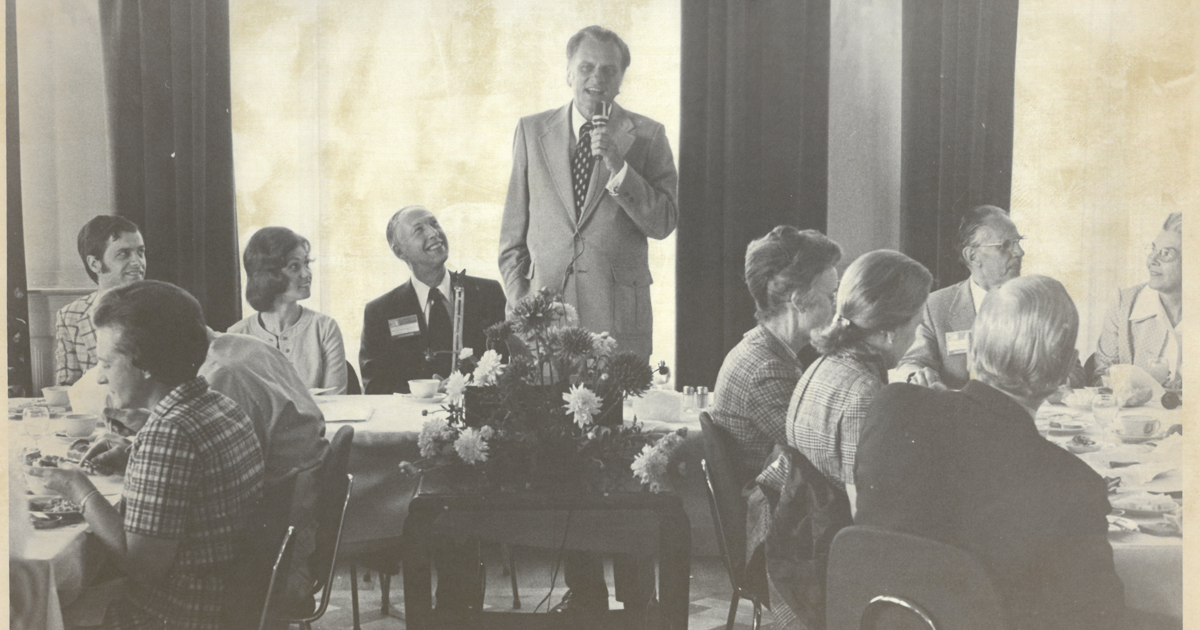
Graham (standing) and Hudson T. Armerding '41 (left of Graham) at the Wheaton Fellowship prayer breakfast at the First International Congress on World Evangelization (1974).
Photo courtesy of Wheaton College Archives and Special Collections
In 1975, Stott served as the Lausanne Covenant’s primary architect, working with Armerding and a drafting committee to finalize the document’s 15 foundational Christian beliefs. The covenant has since been distributed to tens of thousands of people around the world. During a Lausanne Movement Podcast interview, Doug Birdsall ’75, who served as executive director of the Movement from 2004–2013, said, “The Lausanne Covenant really articulated the convictions, the sheer beliefs and values of evangelicals around the world in non-sectarian language. And very quickly people began to identify with one another from across geographical, theological, and organizational lines by asking, ‘Do you embrace the Lausanne covenant?’ So, it really did create a global community.”
Not long after Lausanne ’74, Wheaton’s student body president, Doug Meye ’75, distributed copies of the Covenant during a chapel service, encouraging attendees to sign it after prayerful consideration. This was done with the approval of Wheaton College President Armerding, who saw this as a valuable opportunity to expand the Covenant’s influence on the local campus level and beyond.
A Continuation Committee formed to discuss next steps following Lausanne ’74. Here, too, Wheaton connections were prominently involved. Armerding and several alumni participated in the committee’s early years, and Leighton Ford ’52 was voted chair of the committee in 1976. Wheaton parent Vonette Bright, well known for chairing the U.S. National Day of Prayer task force, was one of three women on the committee.
Wheaton parent Vonette Bright at the Second International Congress on World Evangelization (1989).
Photo courtesy of Wheaton College Archives and Special Collections
In an address to this committee, Graham shared three goals that had been accomplished at Lausanne ’74, according to Don Hoke ’41, who directed the congress: It provided a new look at world need, revealed how spiritual awakening was taking place in many parts of the world, and presented a new sense of global Christian responsibility. “We have seen that the whole Church must be committed to reach the whole world,” said Graham to the committee. A couple of years later, Ford would add in an interview, “Lausanne helped to initiate new efforts of evangelization, theological study, and Christian education.”
The Second International Congress on World Evangelization (or Lausanne II) took place from July 11−20, 1989, in Manila, Philippines. Representing 173 countries, 4,300 participants attended. Lausanne II saw an increase in representation among attendees, such as a higher percentage of women and young leaders, and more than 300 new ministry partnerships formed from the gathering. Lausanne II also led to the Manila Manifesto, which reflects the unique challenges the church was facing in 1989 and clarifies previous theological points from the Lausanne Covenant. Leighton Ford '52 speaking at the Second International Congress on World Evangelization (1989). Photo courtesy of Wheaton College Archives and Special Collections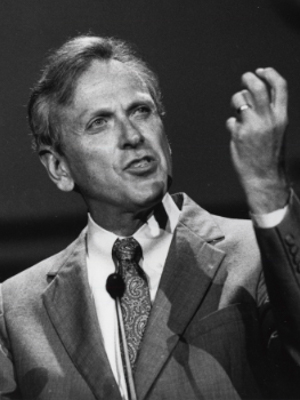
Smaller gatherings cropped up before the next major congress, including the 2004 Forum for World Evangelization in Thailand, where 1,500 missiologists, teachers, evangelists, and practitioners worked together in 31 Issue Groups. In 2006, the Younger Leaders’ Gathering in Malaysia enabled Christian leaders between the ages of 25 and 35 from more than 100 countries to focus on the role of young leaders in global evangelization and the issues those leaders faced in their communities.
Four thousand participants gathered for the Third Congress on World Evangelization in Cape Town, South Africa from October 16–25, 2010. Lausanne III was the first event in the Movement to integrate virtual participation, enabling more than 600 sites in over 90 countries to participate from afar.
Under Birdsall’s leadership, the Lausanne Movement further realized its goal to form a truly global ministry. “I saw Lausanne III . . . as a gift exchange,” said Birsdall on an episode of the Lausanne Movement Podcast. “Let’s come together because you’ve got something I don’t have, and I have something you might need. And maybe there’s something . . . we could both discover together. So, the fact that the Lausanne Movement is a global network of Christ-centered, biblically informed evangelicals who are learning to trust each other, collaborate, and encourage one another is such a gift.”
These foundational values continued to influence generations of students and alumni at Wheaton. Many generous contributors chipped in financial resources to help send a group of Wheaton student volunteers to Lausanne III. However, the roles students were assigned were not what they initially expected. In place of having roles that felt important to them, most students were tasked with assignments such as “sitting by a door and making sure people had their name tags,” as JJ Oslund ’12 described in his reflection paper after the event. Yet the assignment had unexpected blessings. Through this experience, Oslund had the chance to share the gospel with and distribute Bibles to several security guards serving with him.
Other students were transformed by seeing the global church with their own eyes for the first time. For example, Graham Smith ’12 gained a greater understanding of worshipping God and new interpretations of certain texts. “The things that are closest to us are sometimes the hardest to see, and the multitude of voices helped bring out those things about God that we can forget or look past because we are so familiar with them,” Smith wrote in his paper. Poster from the Third International Congress on World Evangelization, held in Cape Town, South Africa (2010). Photo courtesy of Wheaton College Archives and Special Collections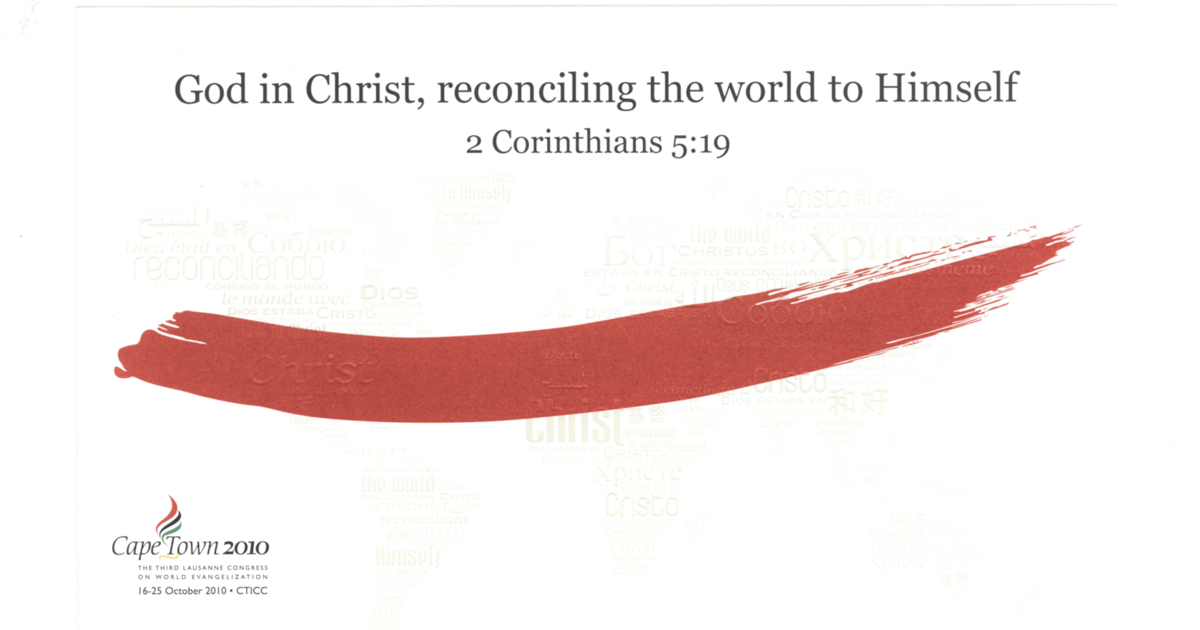
Piper presented an exposition on Ephesians 3, highlighting three scenes depicted in the chapter that “reveal the cosmic purposes of God which he accomplished in Christ Jesus.” He also addressed “the mystery of the gospel” and how God uses suffering and prayer and claimed that Christians should “care about all suffering, especially eternal suffering.”
Lausanne III produced the Cape Town Commitment, which is divided into two parts: “For the Lord we love: The Cape Town Confession of Faith” and “For the world we serve: The Cape Town Call to Action.” The commitment models the apostle Paul’s instruction by linking doctrinal statements with practical instruction. In the foreword of the document, Birdsall wrote, “Its prophetic call to work and to pray will, we hope, draw churches, mission agencies, seminaries, Christians in the workplace, and student fellowships on campus to embrace it and to find their part in its outworking.” The Cape Town Commitment remains required reading in every First Year Seminar class for new students at Wheaton.
Paul Ericksen M.A. ’82, who has served as a liaison to the Lausanne Movement in Wheaton’s Archives and Special Collections, holds a unique vantage point for Wheaton’s relationship with the Movement. Since 1978, Lausanne has made Wheaton its designated archival partner. “These organizational records document the planning, convening, and impact of this global movement to spread the gospel, making them a valuable source for research for Wheaton students and faculty, and the broader missiological and scholarly community,” said Ericksen. “In selecting Wheaton to be the custodian of these records, the Lausanne Movement reinforced the value it places on evangelism and established its strategic preservation of the historical account of its activities and influence for evangelistic motivation, ongoing leadership development, scholarly research, and inspiration.”
Since 2019, the Lausanne Movement has engaged in a multi-year process called Lausanne 4, focused on the global church’s collaboration to disciple and positively impact the nations with 2050 in sight. The Fourth Lausanne Congress on World Evangelization in Seoul, Korea, in September 2024 was an integral part of this process, marking the 50th anniversary of the Movement.
Jared Falkanger ’13, M.A. ’19, Director of Wheaton’s Office of Ministry and Evangelism, co-led a volunteer cohort to Seoul-Incheon that included 17 undergraduate students, three recent alumni, and two graduate students. Lausanne covered registration costs for the group, and remaining expenses were covered by students, private fundraising, and Student Development funds. Jared Falkanger ’13, M.A. ’19 worships alongside Wheaton students and fellow staff at the Fourth Lausanne Congress (2024). Photo by Grace Snavely
The Seoul Statement, written prior to Seoul-Incheon 2024, discusses global mission in the present day. According to Lausanne’s website, the statement renews the Movement’s “commitment to the centrality of the gospel and to the faithful reading of Scripture. Only in this way can we meet the . . . challenges that now face the global church as we seek to bear faithful witness to our crucified and risen Lord—from everywhere, to everywhere, for the sake of generations to come.”
“God really stirred in me a heart to pray for and talk about what he is doing in and through the persecuted church,” said Kathryn Boyd ’28, one Wheaton student volunteer at the congress. “So many of our brothers and sisters across the world are suffering for their faith, and a way to honor them is to pray for them but also boldly share our faith because we have a lot more freedom to do so.”
Following the Seoul congress, there were numerous opportunities on Wheaton’s campus to engage with content from the congress, including a read-aloud launch of Lausanne’s new creation care document, “Korean Invitation: Good News for All the Earth.” At a “Lausanne Testimony Night” hosted by World Christian Fellowship, Ryken shared highlights of his experience and expressed gratitude that he and many members of the Wheaton College community were able to be involved in Seoul-Incheon 2024. Two undergraduates and one graduate student also spoke on how they were impacted by attending Seoul-Incheon 2024.
In 2012, Birdsall told Ryken, “Wheaton has meant so much to global evangelicalism and to Lausanne.” As the Wheaton community continues to actively engage with the work of the Movement, they join with Lausanne’s community all around the world to “effectively accelerate global mission together.”
